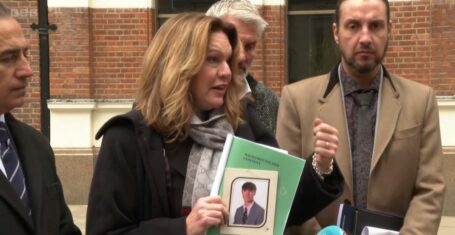R World: The new charity set up in honour of Notts grad Robbie Curtis after his tragic death
We spoke to former Notts student Robbie Curtis’ mother and personal tutor, discussing student mental health and the charity that they have set up in his memory
A new charity has been set up by family and friends in honour of Robbie Curtis, a Notts grad who sadly passed away last year.
Robbie was described as a bright, inspirational student of the University of Nottingham, who graduated last year with a first and received a scholarship to do a masters degree at Sussex University.
Friends described Robbie as a loved and kind person, who ran marathons for charity, was Social Sec in UoN’s GeogSoc, enjoyed travelling and immersing himself in the culture.
Robbie sadly passed away last year, and his mother has set up a charity in his honour that aims to bring attention to the dangers of not speaking about mental health and how to reach out when you are struggling. They want to promote positive mental health and start a conversation around the often taboo subject, making sure the young people are aware of the support available to them, and how to reach out.
This charity uses Robbie’s story to create a positive impact, helping others to help others. They are helping to fund a school in Zambia, where Robbie was hoping to work, which would be life-changing to its citizens, helping the community to become self-sufficient.
His mother, Lesley, sees R World as creating a “lasting legacy” that honours the life of her son, supporting causes that he would have approved of. She hopes to integrate Mental Health First Aid into teaching, as it is important that everybody knows what to do in these situations.
She sees Robbie’s story as being so important: “if it happened to Robbie, it could happen to anyone, and therefore it is vital that people receive training to know how to respond. He didn’t have a history of depression, and is not what people stereotypically picture, which is why it is crucial for people to understand that depression is different for everyone, and manifests itself in different ways for everyone.”

Robbie’s personal tutor, Nick Clare, described him as an “exceptional student, who was very kind and supportive to his fellow students, often helping others with work.” He was a very gifted writer, receiving full funding for a master, which was very rare to achieve.
As a lecturer at UoN, Nick sees everyday the impact of student’s mental health, an extreme situation which has been exacerbated by the dire effects of the pandemic. He spoke to some of Robbie’s friends, and highlights that some did not know how to offer him the support that he needed.
Founders believe that this is why charities such as R World are “so important”, as it would train students in how to deal with mental health crises, so they never feel as though they are helpless in these situations. Nick wants to encourage his peers and fellow members of staff to also undergo this mental health training, and hopefully roll it out to other departments at the university, and other universities. He “never wants this to happen to another student”, he wants them to flourish and enjoy their time at university, “without mental health being a barrier.”

Through R World, Nick received a three day long mental health training course, which is currently not offered by the University of Nottingham to its staff, they are just taught ‘signposting measures’. He relays the importance of recognising the signs early on, when it is easier to help others, it is often left far too late; if universities would invest in training for early-on preventative measures, it would not get to this stage. He agrees that training is vital for lectures; members of staff can often be well meaning but perhaps say the wrong things, as they do not have the guidance to deal with these situations.
R World offers student specific training, so a few key members of the student body would be trained, and they could go on to train fellow students, creating a group of people who know how to respond in mental health crises. This is vital, as often students feel more comfortable discussing personal issues with peers rather than a member of staff, and they would now know how to respond. It can be difficult to approach your personal tutor to discuss intense topics, some people don’t speak to them, others don’t even know who they are.
To find out more about Robbie, or to donate to his charity, watch his video story here, and visit R World.
If you or someone you know has been affected by this story, please speak to someone or contact Samaritans on 116 123 at any time. You can also contact Anxiety UK on 03444 775 774, Mind on 0300 123 3393, and Calm (Campaign against living miserably, for men aged 15 to 35) on 0800 58 58 58.









































